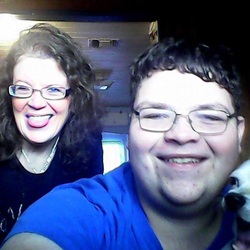
the Soul: Tough Times, Tough People.
"Marks on the Heart"
By Debbie Roppolo
“Your son Joseph has autism.”
I dug my fingernails into the arm of the chair, feeling that at any moment I’d sink into the floor. That wasn’t the diagnosis I’d expected to hear from
the doctor.
A short time after his third birthday, Joseph’s speech progression slowed.
My husband and I were both concerned, but not overly alarmed. Our older
son Jonathan had a speech delay at this age. Joseph would have speech
therapy, empowering him to overcome this obstacle, just as his brother had.
But autism? I shook my head. The doctor was wrong.
Across the room, Joseph rummaged though a toy box. He giggled as he
pulled a plastic phone from the heap. I suppressed my laughter. As usual,
my son’s joy was infectious. He was too happy. All the autistic children
I had ever seen had been withdrawn. There was no way Joseph was autistic.
“That can’t be right,” I insisted. “Look at him. He’s happy. He can read words
too advanced for his age.” A lump formed in my throat as Joseph, smiling, climbed
into my lap and wrapped his arms around my neck. Tears ran down my face as I
felt his breath on my cheek, his heart pounding against my chest. In my eyes, my
child was perfect. Now a total stranger was telling me he wasn’t.
“And video games. He can buy games on my cell phone,” I sobbed.
The doctor cleared her throat and said, “Joseph is what we call ‘high-functioning autistic’.
That means he’s of average intelligence or above. But,” she continued, “there’s to be no
excuses. Treat him like you would a typical child, or you’ll let autism cripple him.
Do you understand?”
The only thing I understood is that I had plans for Joseph. He’d be a leader, leaving his
mark on every life he touched. Now those goals were slipping away, faster than water
through a sieve.
In the following weeks, I floundered in a well of depression. I doubted my ability as a parent.
I berated myself, believing I would’ve noticed the symptoms earlier if I’d have spent more time
with Joseph and less on my writing. And it didn’t boost my self-esteem when people said:
“My goodness, what did you do while you were pregnant?” or “I guess it’s genetic. From your
side of the family?” No matter what was said, they made it obvious I was the one to blame for
Joseph’s condition.
I hated going out in public. It was then Joseph acted the most autistic: yelling spontaneously,
rocking back and forth, and slapping his face. All of which drew stares and whispers from onlookers.
I hated them all, especially the ones with well-behaved, typical children present. And I detested
myself for not wanting to be seen with my precious son.
As a means to de-stress and maintain my sanity, I took nightly walks. One night, as I had so many
times in the past, I looked to the heavens for answers to sooth my troubled heart. As I gazed at the
stars, twinkling like gems against a canvas of black velvet, I came upon a realization. It wasn’t my fault.
I didn't cause Joseph to be autistic. I couldn't have done anything to prevent it. I could only move forward
and do what I could to help my son overcome his disorder.
I stopped placing blame on my husband, and began working with him, researching different programs
and placing Joseph in occupational and speech therapy. I read everything I could, educating myself
and other people on the disorder.
I began to see Joseph as he really was, a perpetual, mischievous ball of energy, not much different
than other children his age. I marveled over how he lived every second to its fullest, not caring what
people thought.
Once, in the grocery store, he burst onto gleeful, spontaneous yells. Cringing as passersby gave us
cold stares, I tried in vain to silence him. “Oh let him holler,” an elderly woman said, breaking into a
toothless grin. “He’s just making a joyful noise, that’s all. Warms my heart to hear him."
Joseph pondered things I took for granted; the way a raindrop left a crooked path on the window, the
swoosh of wings as birds took flight. Even the setting of the sun left him in breathless wonder. Following
his lead, I too began to marvel at the little things in life, and I couldn’t believe what I’d been missing.
As it was, Joseph hadn’t strayed too far away from my goals. He was leaving his mark on every life
he touched--especially mine.
Debbie Roppolo is the proud mother of an extraordinary young man who happens to have autism, and whose tenacity inspires her every day. Debbie is an award-winning writer, submissions editor for DWB Publishing, and the author of the Amelia Frump children's book series. She is an advocate for people with special needs, and is the co-founder of Central Texas Autism Network.


 RSS Feed
RSS Feed
